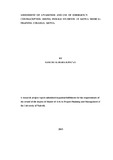| dc.description.abstract | Young and unmarried women constitute a high risk group for unsafe abortions. It has been estimated that widespread use of emergency contraception may significantly reduce the number of abortion-related morbidity and mortality. The aim of this study was to establish the level of awareness and use of emergency contraception by female college students at KMTC through a cross–sectional survey. Specifically the study sought to determine awareness of existence of emergency pills, knowledge of correct timeframes for use, the sources of emergency pills, whether easy access leads to risky sexual behaviour and the sources of information on emergency pills. The study was conducted at six campuses namely Mombasa, Machakos, Nairobi, Nyeri, Nakuru and Kisumu. Stratified random sampling was used in this study. All qualitative responses were edited and coded before data entry. The data was then analyzed using the Statistical Package for Social Sciences version 21.0. From the study, it was found that 79.6 % of the students were aware of the existence of emergency contraception. However, knowledge of the correct timing in the use of emergency contraception was insufficient with only 59.8% reporting the correct timeframe. The most common source for the drugs was the chemists at 76.4%. 64.1% of the students felt that access to emergency pills would not increase their chances of engaging in more unprotected sex while 56.8% felt emergency pills do not promote promiscuity. The sources of information regarding emergency pills were female friends (37.2%), health care providers (22.8%), boyfriends (20.4%) and the media (2.2%). From the study, it was concluded that knowledge of existence of emergency pills was sufficiently high. However, knowledge of correct timeframes for use was poor. The chemists were the most popular sources of procurement for emergency pills. It was also concluded that access to emergency pills does not promote irresponsible sexual behaviour. From the study, it is recommended that students be provided with appropriate information regarding emergency contraception especially regarding the correct timing. Access to emergency contraception should be improved in the college either through the college clinics or with a responsible person in the hostels. It was also suggested that detailed information regarding emergency contraception should be provided to the students in their first year of college during the attitude training. This will create awareness early enough in order to prevent pregnancies and possible abortions while the girls are still in college. The results of this study will be important in policy formulation in training institutions and the Ministry of Health and will help to curb the rising cases of teenage pregnancy. | en_US |

